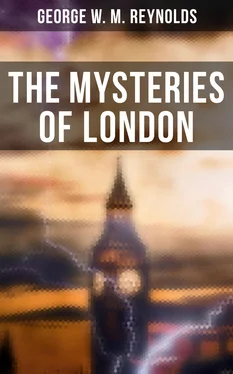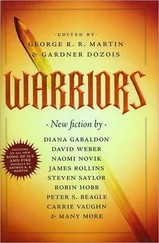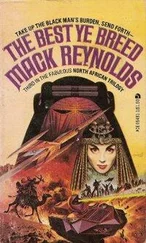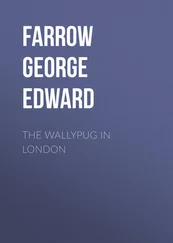"Oh! how kind in him thus to interest himself in my behalf," murmured Eliza; "and I—who am so unworthy of his commiseration!"
"Do not say that! we have made enquiries, and we have found how you have been deceived. We have seen your faithful servant Louisa; and she has told us enough to convince us that you was more to be pitied than blamed. One thing I have to communicate which will console you—I have taken Louisa into my service!"
"A thousand thanks, my dear madam," said Eliza. "The thought of what was to become of her has made me very unhappy. This is indeed one subject of comfort. But I saw Louisa yesterday: why did she keep me in the dark in this respect?"
"We enjoined her to maintain the strictest silence," returned Mrs. Arlington. "We were determined to see how you would act up to the very last moment in this distressing business, ere we allowed you to know that you had friends who cared for you."
"And how have I obtained this generous sympathy?" enquired Eliza, pressing Diana's hand with an effusion of gratitude.
"The Earl loved your mother, and blames himself for his neglect of her children, whose welfare would have been dear to his deceased uncle," said Diana gravely. "And for myself," she added, blushing—"anything which interests the Earl, also interests me."
"Believe me, I shall never forget this kindness on your part:—neither shall I ever be able to repay it," observed Eliza. "I am now going to a protracted incarceration, in a terrible prison," she continued mournfully—"and God only knows whether I may survive it. But until the day of my death shall I pray for you and that good nobleman who forgives, pities, and consoles me."
"He does—he does," said Mrs. Arlington, deeply affected: "but fancy not that your confinement will pass without being relieved by the visits of friends. I shall call and see you as often as the regulations of the prison will permit; and I again renew the promise which the Earl has authorised me to make relative to his intercession with the Secretary of State in your favour."
Eliza again poured forth her gratitude to Diana, and they then separated. The former was conveyed back to Newgate: the latter hastened to the humble hackney-coach which she had purposely hired to take her to the Old Bailey.
As soon as the case of Stephens, Mac Chizzle, and Eliza Sydney was disposed of, William Bolter was placed at the bar to take his trial for the murder of his wife.
"The miscreant"—as the newspapers had called him all along—wore a sullen and hardened appearance; and pleaded Not Guilty in a brutal and ferocious manner. The only feature of interest in the case was the examination of his son—his little son—as a witness against him. The poor boy seemed to comprehend the fearful position in which his father was placed; for he gave his evidence with the utmost reluctance. There was, however, a sufficiency of testimony, direct and circumstantial, to induce the jury to find the prisoner guilty without a moment's hesitation.
The Judge put on the black cap, and proceeded to pass upon the culprit the awful sentence of the law. Having expatiated upon the enormity of the prisoner's guilt, and admonished him to use the little time that remained to him in this world for the purpose of making his peace with heaven, he sentenced William Bolter to be taken back again to the place from whence he came, and thence to a place of execution, where he was to be hanged by the neck until he should be dead . "And may the Lord," added the Judge solemnly, "have mercy upon your soul."
There was some years ago, amongst ruffians of the very worst description, a custom of abusing the Judge, or "blackguarding the Beak," as it was called, when they received the award due to their crimes, in the felon's dock. This miserable and vain bravado—an affectation of recklessness which even the most hardened could scarcely feel—was revived by Bill Bolter upon the present occasion. "Taking a sight" at the Judge, the murderer commenced a string of horrible abuse—laden with imprecations and epithets of a most shocking and filthy nature. A shudder passed through the audience as if it were one man, at that revolting display on the part of a wretch who stood upon the edge of the tomb!
The officers of the court speedily interfered to put an end to the sad scene; and the convict, after a desperate resistance, was carried back to Newgate, where he was lodged in one of the condemned cells.
While these important cases were being disposed of in the Old Court, two others, which it is necessary to notice, were adjudicated upon in the New Court before the Recorder. The first was that of Thomas Armstrong, who was fortunate enough to be acquitted for want of evidence, George Montague, a principal witness against him, not appearing;—the other was that of Crankey Jem and the Resurrection Man. It is needless to enter into particulars in this matter: suffice it to say that the former was convicted of a daring burglary, upon the testimony of the latter who turned King's evidence. Crankey Jem was sentenced to transportation for life, he having been previously convicted of serious offences; and the Resurrection Man was sent back to Newgate to be discharged at the termination of the sessions.
The business of the Court was concluded in a few days; and Richard was removed to the Giltspur Street Compter. There he was dressed in the prison garb, and forced to submit to a régime peculiarly trying to the constitution of those who have been accustomed to tender nurture. The gruel, which constituted his principal aliment, created a nausea upon his stomach; the thin and weak soup was far from satisfying the cravings of the appetite; the bread was good, but doled out in miserably small quantities; and the meat seemed only offered to tantalise or provoke acuteness of hunger.
The Resurrection Man was set at liberty.
Stephens, Mac Chizzle, and Crankey Jem were removed to the hulks at Woolwich, previous to the sailing of a convict-ship for New South Wales.
Eliza Sydney remained in Newgate.
Bill Bolter, the murderer, also stayed for a short season in the condemned cell of that fearful prison.
CHAPTER XXXIV.
THE LESSON INTERRUPTED.
Table of Contents
THE moment the trial of Richard Markham was concluded, Sir Rupert Harborough and Mr. Chichester bade a cold and hasty adieu to Mr. Talbot, and left the court together.
They wended their way up the Old Bailey, turned into Newgate Street, and thence proceeded down Butcher-hall Lane towards Bartholomew Close; for in that large dreary Square did Mr. Chichester now occupy a cheap lodging.
This lodging consisted of a couple of small and ill-furnished rooms on the second floor. When the two gentlemen arrived there, it was past five o'clock—for the trial had lasted the entire day; and a dirty cloth was laid for dinner in the front apartment. Black-handled knives and forks, a japanned pepper-box, pewter saltcellar and mustard pot, and common white plates with a blue edge, constituted the "service." The dinner itself was equally humble—consisting of mutton-chops and potatoes, flanked by a pot of porter.
The baronet and the fashionable gentleman took their seats in silence, and partook of the meal without much appetite. There was a damp upon their spirits: they were not so utterly depraved as to be altogether unmindful of the detestable part they had played towards Markham; and their own affairs were moreover in a desperate condition.
A slip-shod, dirty, familiar girl cleared away the dinner things; and the gentlemen then took to gin-and-water and cigars. For some minutes they smoked in silence; till at length the baronet, stamping his foot impatiently upon the floor, exclaimed, "My God! Chichester, is nothing to be done?"
"I really don't know," answered that individual. "You heard how deucedly I got exposed to-day in the witness-box; and after that I should not dare show up at the west-end for weeks and months to come—even if the sheriff's officers weren't looking out for me."
Читать дальше












